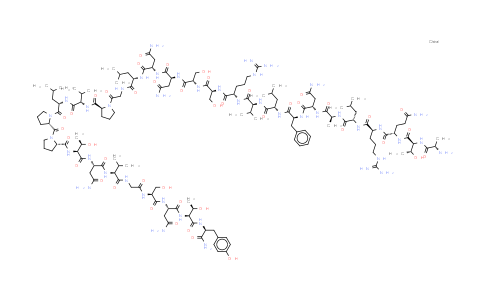
Amylin (8-37), rat NLT 98%
Product Number : MC520943
CAS Number : 138398-61-5
Molecular Formula : C140H227N43O43 | Molecular Weight : 3200.56
Synonyms : Amylin (8-37) (mouse, rat)
Quote Request| Purity | NLT 98% |
|---|---|
| Storage | at 20ºC 2 years |
| MolCore specializes in manufacturing high-purity CAS No.138398-61-5, Amylin (8-37), rat with the molecular formula C140H227N43O43 and molecular weight 3200.56 delivering critical API intermediates for global pharmaceutical and research industries, certified under ISO quality systems. | |
* The above information is for reference only.
| Chemical Name | Amylin (8-37), rat |
|---|---|
| CAS Number | 138398-61-5 |
| MDL Number | MFCD00214573 |
| Molecular Formula | C140H227N43O43 |
| Molecular Weight | 3200.56 |
| Synonyms | Amylin (8-37) (mouse, rat) |
Amylin (8-37), rat is a truncated analog of native Amylin that selectively inhibits insulin-related glucose uptake and glycogen deposition in muscle tissue. Amylin (8-37), rat is a weak amylin receptor (AMY) antagonist. IC50 & Target: Amylin receptor (AMY)[1] In Vitro: Amylin (8-37), rat (Rat amylin-(8-37)) enhances insulin action and alters lipid metabolism in normal and insulin-resistant rats. Amylin (8-37) reduces plasma insulin (P<0.001) and enhances several measures of whole body and muscle insulin sensitivity (P<0.05) in both saline- and hGH-infused rats. Amylin-(8-37) corrects hGH-induced liver insulin resistance, increases basal plasma triglycerides and lowers plasma nonesterified fatty acids in both groups, and reduces muscle triglyceride and total long-chain acyl-CoA content in saline-treated rats (P<0.05). In isolated soleus muscle, Amylin (8-37) blocks amylin-induced inhibition of glycogen synthesis but has no effect in the absence of amylin. Thus 1) hyperamylinemia accompanies insulin resistance induced by hGH infusion; 2) Amylin (8-37) increases whole body and muscle insulin sensitivity and consistently reduces basal insulin levels in normal and hGH-induced insulin resistant rats; and 3) Amylin (8-37) elicits a significant alteration of in vivo lipid metabolism[2].
© Copyright 2015-2025 Hangzhou MolCore BioPharmatech Co.,Ltd. All rights reserved.
